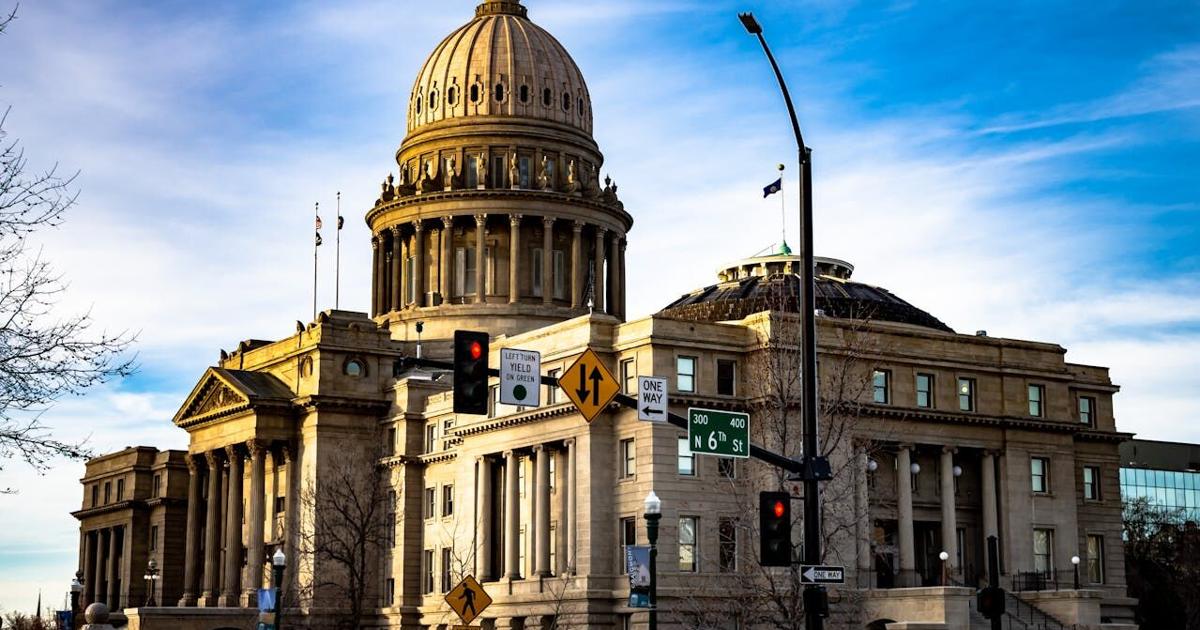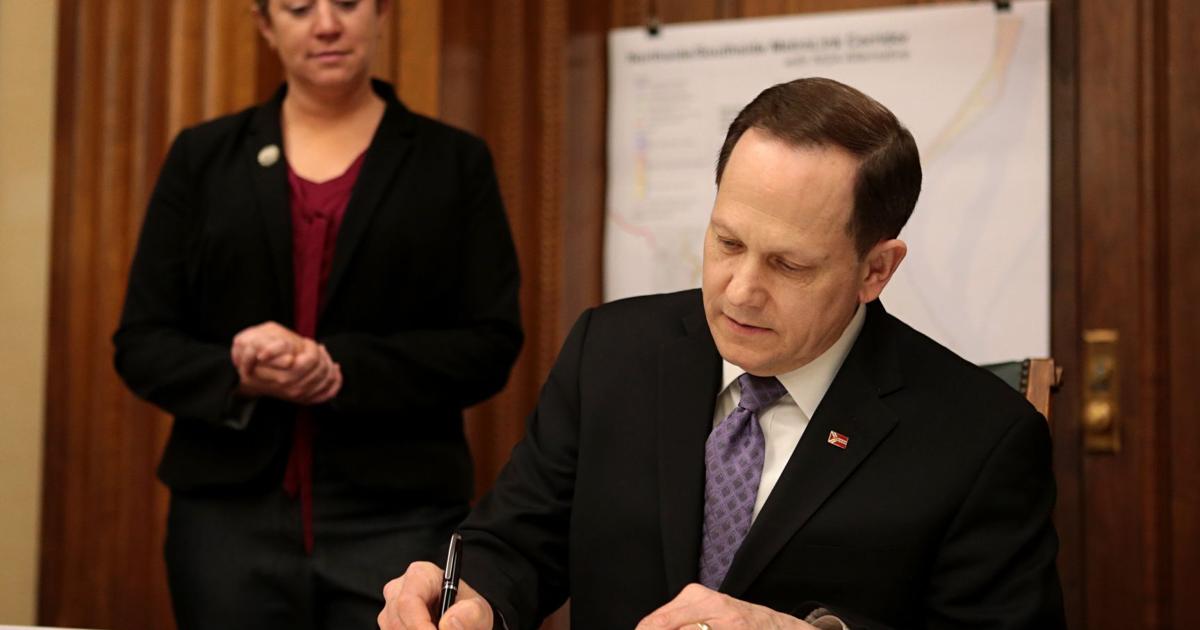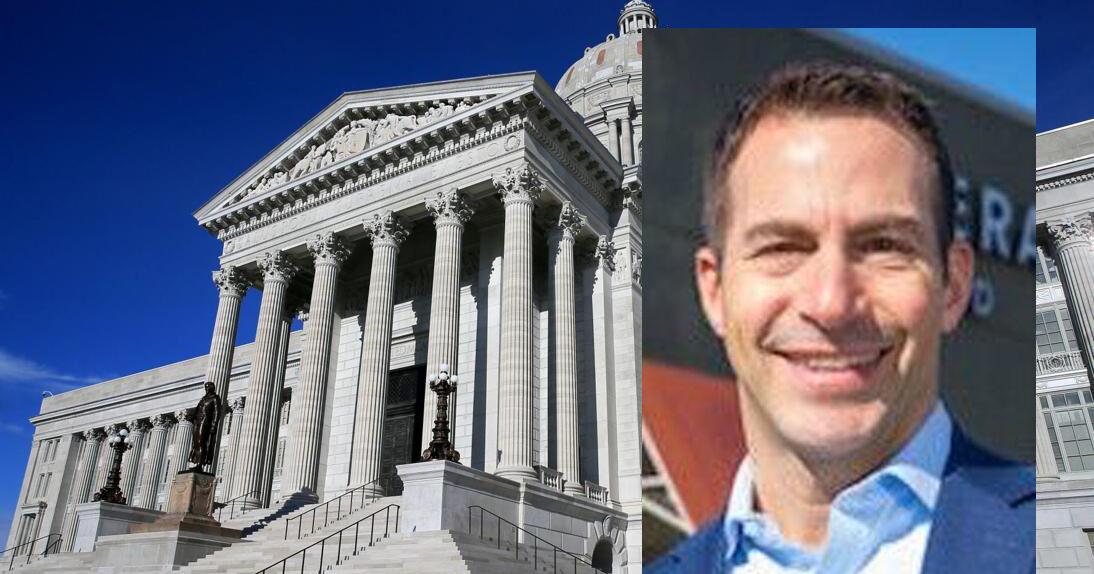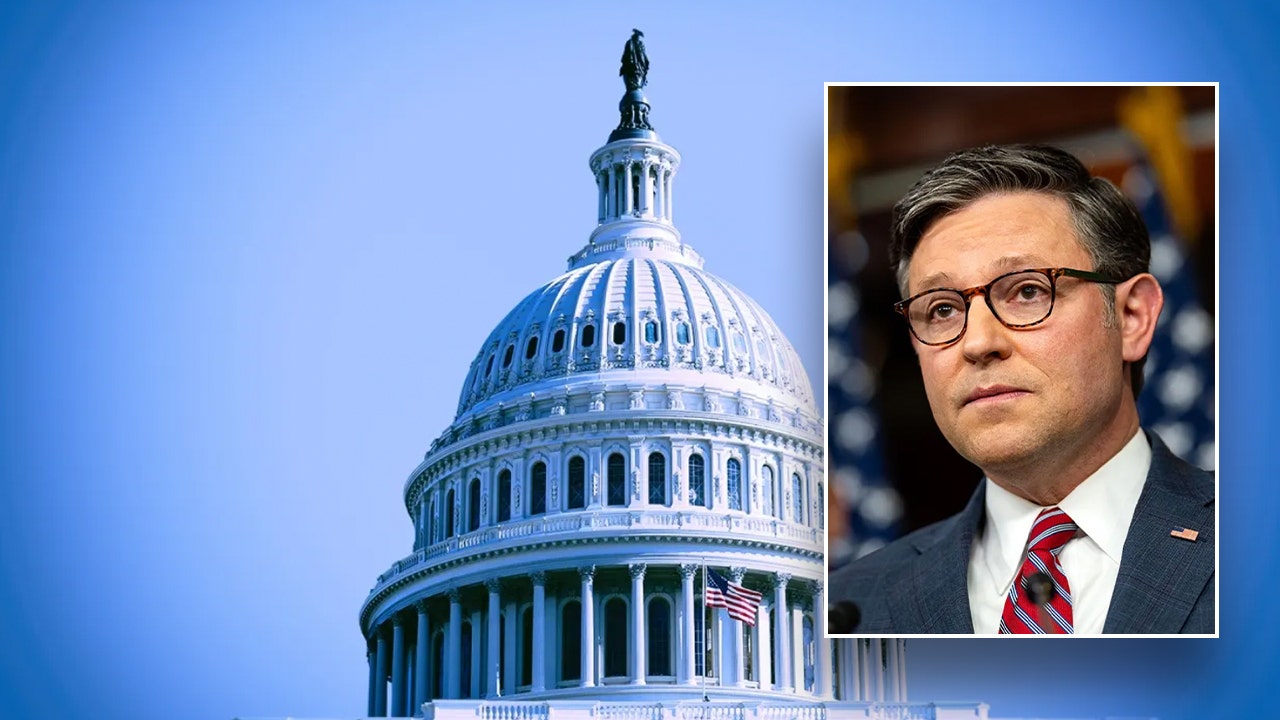Missouri
More than 100 US political leaders, including Missouri’s governor, have ancestors who were slaveholders

MAKING AMENDS: From Belinda Royall to Cori Bush
The idea of paying reparations or making other amends for slavery and discrimination has a long history in the United States.
1783: A freedwoman named Belinda Royall asks the Massachusetts legislature for reparations and is granted a pension of 15 pounds, 12 shillings out of the estate of the man who had enslaved her.
1865: Months before the U.S. Civil War ends, federal legislation calls for land to be leased or sold in 40-acre parcels to people who had been enslaved, reminiscent of Union General William Tecumseh Sherman’s field order authorizing the redistribution of land confiscated from or abandoned by Confederates to the newly emancipated. But white Southerners abandoned little land, and Congress didn’t provide funds to buy land for freedmen.
1868: The 14th Amendment, passed by Congress in 1866, is ratified by the states. It grants citizenship to “all persons born or naturalized in the United States, and subject to the jurisdiction thereof” — including the formerly enslaved. It provides that they cannot be deprived of life, liberty or property without due process, and that they are entitled to equal protection of the laws.
1878: Henrietta Wood wins $2,500 for lost wages and loss of freedom in a lawsuit she had brought in Ohio against an Ohio deputy sheriff who had engineered a kidnapping that led to her enslavement. Wood had been born into slavery in Kentucky, freed by a slaveholder who took her to Ohio, then lured back to Kentucky and enslaved again in 1853.
1890: At the urging of Nebraska businessman Walter Vaughan, a Democrat and the son of slaveholders, Republican U.S. Representative William J. Connell introduces a bill proposing the federal government provide pensions to those formerly enslaved. Although the bill fails, Vaughan keeps publicizing an idea that he sees primarily as a way to inject cash into the South’s struggling economy.
1898: U.S. Representative Jeremiah D. Botkin, a Kansas Democrat, introduces a bill to provide individuals who were formerly enslaved 40 acres of land and families 160 acres. The proposal, which also would have provided cash payments, fails to pass.
1915: Callie House, a formerly enslaved person inspired by a pamphlet produced by Nebraska businessman Walter Vaughan, works with attorney Cornelius Jones to sue the U.S. Treasury Department, arguing the federal government had benefited financially via taxes from the sale of cotton produced by the enslaved. The suit estimates the federal government had collected $68 million in taxes that should be returned to the formerly enslaved. The District of Columbia Court of Appeals dismisses the suit, saying the government cannot be sued without its permission.
1960: In a speech in Boston, Malcolm X declares the United States must “compensate us for the labor stolen from us,” calling for land.
1961: The term “affirmative action” is used in an executive order signed by President John F. Kennedy instructing federal contractors to ensure that applicants are treated equally. While some point to affirmative action as a way to address the legacy of slavery and racial discrimination, others note it does little for Black Americans who are unable to benefit from the concept in higher education and jobs.
1966: The 10 Point Program of the Black Panther Party includes: “We Want An End To The Robbery By The Capitalists Of Our Black Community. We believe that this racist government has robbed us, and now we are demanding the overdue debt of forty acres and two mules. Forty acres and two mules were promised 100 years ago as restitution for enslaved labor and mass murder of Black people. We will accept the payment in currency which will be distributed to our many communities.”
1968: The Republic of New Africa, a Black nationalist group, calls for $400 billion in reparations for slavery.
1969: James Forman of the Student Non-Violent Coordinating Committee stands at the pulpit at Riverside Church in New York to demand that “white Christian churches and Jewish synagogues which are part and parcel of the system of capitalism” pay $500 million in reparations to be spent on a land bank for Black farmers, publishing houses and TV networks to provide jobs and a voice for Black Americans, and other projects.
1972: Mayor Richard G. Hatcher of Gary, Indiana, U.S. Representative Charles C. Diggs. Jr. of Michigan, and poet and playwright Amiri Baraka are among the organizers of a National Black Political Convention in Gary. More than 2,000 voting delegates adopt a final declaration that includes a call for a majority-Black commission to determine how to calculate and distribute reparations “in terms of land, capital and cash.”
1973: Yale law professor Boris Bittker, working with editor Toni Morrison, publishes “The Case for Black Reparations.”
1987: The National Coalition of Blacks for Reparations, known as N’COBRA, is founded.
1989: Representative John Conyers, a Michigan Democrat and an African-American, first introduces House Resolution 40 — the figure refers to “40 acres and a mule” — proposing a federal commission to study reparations for slavery and its legacy. Conyers introduces H.R. 40 at every congressional session until his retirement in 2017, after which Representative Sheila Jackson Lee, a Democrat from Texas who is Black, continues to introduce the bill.
1993: A conference in Nigeria sponsored by an Organization of African Unity (OAU) reparations committee concludes the impact of slavery and the slave trade damaged lives “of contemporary Africans from Harlem to Harare” and economies worldwide. The final declaration urges the OAU — precursor to the African Union — to call for reparations that could take such forms as capital transfers and debt cancellation.
1994: Florida legislators authorize payments of $150,000 for each of the nine survivors of a 1923 attack by white people that killed at least six people and destroyed the Black community of Rosewood; a $500,000 pool of funds for their descendants; and individual $4,000 scholarships for the youngest generation of descendants of the victims.
2000: Randall Robinson, who had gained prominence as an anti-apartheid campaigner and a co-founder of the TransAfrica Forum think tank, publishes “The Debt: What America Owes to Blacks.” He argues that “the appeal here is not for affirmative action, but, rather, for just compensation as an entitlement for the many years of heinous U.S. government-empowered wrongs and the stolen labor of our forebears.”
2001: Conservative author David Horowitz places advertisements in U.S. college newspapers detailing “ten reasons why reparations for slavery is a bad idea – and racist too.” Among his points, he argues that the claim that all African-Americans suffer from the economic consequences of slavery and discrimination is “unsubstantiated” and that reparations have already been paid in the form of welfare benefits and racial preferences in jobs and education.
2006: A faculty, student and administrator committee appointed by Brown University President Ruth J. Simmons releases a report detailing ties to slavery of several Brown founders and benefactors. The university later takes such steps as offering free tuition to graduate students in the field of education who pledge to serve in public schools in Providence and surrounding areas, and creating a $10 million permanent endowment to support education in Providence.
2007: State lawmakers in Alabama, Maryland, North Carolina and Virginia formally apologize for slavery and, in the case of North Carolina and Virginia formally apologize for slavery and, in the case of North Carolina, for Jim Crow. Virginia was the first U.S. state to make such an apology.
2008: State lawmakers in New Jersey and Florida formally apologize for slavery.
2014: Author and journalist Ta-Nehisi Coates publishes “The Case for Reparations” in The Atlantic.
2015: The president of Georgetown University creates a working group on the ties to slavery of the Catholic university, whose future had been secured by the sale in 1838 of 272 men, women and children who had worked on a Jesuit plantation. After the working group is formed, Jesuits vowed to raise $100 million to benefit the descendants of the people the Catholic religious order owned and to promote racial reconciliation.
2019: Descendants of African American sharecroppers murdered in 1919 by a white mob in Elaine, Arkansas, gather in Elaine to commemorate the massacre and call for reparations, including the return of land that passed into white hands after the killings.
2020: The Denver Black Reparations Council gives its first grant to TeaLee’s Tea House and Bookstore, a Black-owned business, helping the owner stay in business after her husband died. The council is funded by Reparations Circle Denver, which fundraises among white people.
2021: The city council of Evanston, Illinois, votes 8-1 to begin distributing $400,000 to eligible Black residents through $25,000 grants for home repairs, down payments or mortgage payments in reparation for the lasting damage from decades of segregation and discriminatory practices.
Virginia Governor Ralph Northam signs the Enslaved Ancestors College Access Scholarship and Memorial Program. It requires that five universities that profited from enslaved labor provide scholarships to the descendants of the enslaved.
2022: An Oklahoma judge rules the three known living survivors of the 1921 Tulsa massacre, in which a white mob murdered scores of Black Tulsans and razed much of a Black neighborhood, can proceed with a lawsuit seeking reparations. The suit seeks such remedies as a 99-year tax holiday for Tulsa residents who are descendants of victims of the massacre in the neighborhood of Greenwood. The judge also rules that six descendants of victims cannot seek reparations.
The deed to beachfront property in the city of Manhattan Beach, California, that had been taken in 1924 from Willa and Charles Bruce, an African-American couple, is returned to their heirs. What had been a Black resort in then-segregated Los Angeles County was taken by Manhattan Beach officials, ostensibly to build a park. Activists and politicians said the real motivation was racism. A state law in 2021 approved returning the land to the Bruces’ heirs.
Church leaders in Forsyth County, Georgia, after consultation with Black community members, establish a scholarship fund open to descendants of those Black families violently driven out of the county in 1912 after six Black men were accused in the assault of a white woman.
Harvard University announces it is setting aside $100 million for an endowment fund and other measures to close the educational, social and economic gaps that are legacies of slavery and racism.
Boston creates a Reparations Task Force to develop proposals to provide reparations to Black residents to make amends for slavery and racial discrimination.
2023: Final recommendations are approved by California’s governor-appointed Task Force to Study and Develop Reparation Proposals for African Americans. The recommendations include suggested formulas to determine cash reparations and a call for state lawmakers, who will make the final decision on whether reparations should be made and if so what that would entail, to issue a formal apology for the state’s role in perpetuating discrimination against African Americans.
U.S. Representative Cori Bush, a Democrat from Missouri, introduces House Resolution 414, which says that the United States “has a moral and legal obligation to provide reparations for the enslavement of Africans and its lasting harm on the lives of millions of Black people.” It says economists have calculated that reparations to close the racial wealth gap between Black and white Americans would be, at a minimum, $14 trillion. — Donna Bryson, Reuters

Missouri
Who's Mizzou talking to: Friday night update

Who’s Mizzou talking to: Friday night update
Here’s a quick rundown of who we know the Tigers are still in communication with as we hit the final weekend of visits in portal season.
There is supposed to be a dead period for visits starting Monday. That doesn’t mean no more commitments, though.
1. Stephen Hall and Adrian Wilson, Washington State DBs
With Washington State head coach Jake Dickert and quarterback John Mateer both headed out, it seems as if the team I grew up rooting for is headed for a rough season.
Now there are even more headed out as both cornerback Stephen Hall and safety Adrian Wilson are talking to Mizzou. Wilson is scheduled for a visit this weekend, Hall received an offer during the week.
Hall would be the depth corner the Tigers have been looking for to join the room of Toriano Pride, Nick Deloach and Dreyden Norwood.
My understanding was the Tigers were done adding to the safety room, but Wilson would give them a third addition to that crew since the start of the week.
Hall was a 72.6 overall defender and 73.7 coverage defender last season, and is a junior. At this point, it’s difficult to tell how much eligibility he would have left because of the recent Diego Pavia ruling the JUCO years don’t count against NCAA eligibility. Hall played at Northwest Mississippi Community College in 2020, 2021 and 2022, then at Washington State in 2023 and 2024. It’s possible he’s out of eligibility after next year or has another two seasons depending on how the NCAA works with the Pavia ruling.
Wilson is a redshirt freshman who will have three years of eligibility remaining. He graded out as a 68.7 overall defender, 71.5 run defender and 67.4 coverage defender according to PFF.
2. Nate Johnson, edge rusher from Appalachian State
Johnson posted that his recruitment was closed on Friday, while reportedly on a visit at Mizzou, so we should get an answer on this one quickly.
The Tigers have been looking to add to the edge rusher room since the losses of Williams Nwaneri and Jaylen Brown, but I haven’t heard a ton about the other guys they have talked to outside of a lot of offers getting thrown out.
The Tigers offered Johnson in the early days of the portal along with a number of young edge rushers.
Johnson also visited USC, South Carolina, Kentucky and Florida State and also posted offers from LSU and Florida.
Johnson is a sophomore who will have two years of eligibility remaining, who graded out as a 75.2 overall defender, 69.2 run defender and 76.1 pass rusher this season by PFF.
3. Kofi Asare, edge rusher from UMass
Here’s another of the young edge rushers Mizzou has offered this cycle.
The Tigers offered the redshirt sophomore on Thursday. He will have two years of eligibility remaining.
Asare played in 12 games this season, including against Mizzou when he had three tackles including 0.5 for loss. He totaled 30 tackles, 5.5 for loss, three sacks one forced fumble that he also recovered and one pass breakup.
UMass played a surprisingly tough schedule with matchups against Mizzou, Mississippi State and Georgia. In those three games, Asare had five tackles, 1.5 for loss and one sack.
Asare graded out as a 71.5 overall defender, 67.1 run defender and 70.4 pass rusher according to PFF.
Asare or Johnson would join an edge-rusher room that will lose Johnny Walker Jr. and Joe Moore to eligibility and Nwaneri and Brown to the portal.
They would join Zion Young, Eddie Kelly Jr., Darris Smith and Jahkai Lang.
4. TJ Shanahan, offensive lineman from Texas A&M
Mizzou is still working hard to add pieces to the offensive line that is losing 60 percent of its starters from this season in Marcus Bryant and Cam’Ron Johnson to eligibility and Armand Membou to the NFL Draft.
Shanahan is the next in a list of Tiger targets for the line as he is in Columbia for a visit this weekend.
Shanahan appeared in 10 games and made five starts as a freshman this season, playing at both center and left guard through the season.
He opened the season at center, but moved over to guard for his final five games.
Shanahan stands at 6-foot-4, 330 pounds and graded as a 49.3 offensive player, 53.7 run blocker and 54.8 pass blocker this season, allowing two sacks, two quarterback hits and four hurries on 285 total snaps.
He would likely slot in at right guard for the Tigers, taking the spot Johnson is leaving open.
Shanahan will have three years of eligibility remaining.
5. Keagen Trost, offensive lineman from Wake Forest
Like Shanahan, Trost would slot in as a likely starter for Mizzou, unlike Shanahan, he has a whole lot of experience playing college football.
Trost played at Morgan State in 2019, Indiana State in 2020, 2021, 2022 and 2023, then at Wake Forest in 2024.
He will have one year of eligibility remaining.
Trost played right tackle throughout the season, except against Cal when he played left tackle.
He graded as a 70.3 offensive player, 69.1 run blocker and 68.8 pass blocker for Wake Forest this season, allowing three sacks, one quarterback hit and 15 hurries on 772 total snaps.
Trost could slot in at either open tackle slot for Mizzou.
Stay up to date on all the Mizzou news with your premium subscription
Talk about this story in the Transfer Portal Central thread and discuss so much more in The Tiger Walk
Make sure you’re caught up on all the Tiger news and headlines
You can follow me on X @kyle_mcareavy for more news and updates.
Missouri
Missouri Republicans want to restrict abortion again. Can they agree on how? • Missouri Independent

Weeks out from the 2025 Missouri legislative session, Republican lawmakers have already filed dozens of bills aimed at weakening or overturning Amendment 3, the voter-approved measure that legalized abortion in Missouri.
Proposals include returning to voters to ask to re-impose Missouri’s abortion ban, as well as smaller measures attempting to set parameters around Amendment 3, including by defining fetal viability.
This includes lawmaker-proposed constitutional amendments that would ask voters if they want to again ban abortion and attempts to define fetal viability around stringent parameters.
“That’s a powerful witness to the large numbers of pro-life lawmakers who have been elected and re-elected,” said Sam Lee, a longtime anti-abortion activist and lobbyist. “I’m just glad to see so many have taken the initiative to file just a variety of ideas. We’ll just see what rises to the top.”
But Lee foresees hurdles, including the threat of the Senate Democratic filibuster, which last session killed a proposed constitutional amendment seeking to make it harder to pass initiative petitions ahead of Amendment 3 landing on the ballot.
And, despite so many lawmakers naming abortion as their main priority going into the 2025 session, Lee said there is bound to be some competition with other high-profile issues in reaction to Amendment 3’s passage, including how Missouri Supreme Court judges are selected and renewed attempts to raise the threshold to pass initiative petitions.
“People outside the Capitol building find this hard to believe, but there’s relatively little time to get something passed,” Lee said. “These are all potentially lengthy battles.”
If the General Assembly is unsuccessful in pushing through a constitutional amendment that would again ban abortion during the regular session running from January to May, Lee said he and other activists are prepared to call on Gov.-elect Mike Kehoe to convene a special session later in the year.
If that doesn’t happen, Lee said the next step is a citizen-led ballot initiative aimed at overturning Amendment 3 by reinstating an abortion ban.
Incoming House Minority Leader Ashley Aune, a Kansas City Democrat, said throughout her four-year tenure in the legislature, she’s seen Republican colleagues attempt to undo the will of the people after they approve progressive issues at the ballot box.
Aune said she’s skeptical of what the Missouri GOP will be able to accomplish this time.
“My concern would be higher if it seemed these folks had any clear plan to attack this issue,” Aune said. “ … It seems like a lot of people have a lot of different ideas, but there is not a consensus in the Republican Party about how to clearly address this. I don’t know that they’ll be able to get organized enough to get something across the finish line, but I suppose time will tell.”
Rape and incest exceptions
In 2019, when she helped draft the trigger law that would go into effect in 2022 outlawing all abortions in Missouri with exceptions only for medical emergencies, state Sen. Mary Elizabeth Coleman, an Arnold Republican, did not include exceptions for survivors of rape or incest.
Last February, she and her Republican colleagues blocked an attempt to add rape and incest exceptions to the state’s abortion ban.
Now she is among a small handful of Republican lawmakers proposing constitutional amendments that would overturn Amendment 3, but put in place abortion exceptions for survivors.
Asked why she included a rape exception this time, Coleman said “ … in these hard cases, you know, we’re going to provide a path for that, we’ll probably get a bigger percentage of support.”
She maintains that because Amendment 3 ultimately passed on tight margins — with 51.6% of the nearly 3 million votes cast — getting the support of voters to reverse it is possible.
The main question is what language and restrictions to put before voters.
“A Missourian might call themselves pro-life and feel that in the hard cases there should be an exception, but they don’t want unfettered access,” Coleman said. “Somebody might call themselves pro-choice and they are really concerned about people being able to make those decisions, but also recognize the humanity of the unborn child and don’t think you should have abortions into the second and third trimester.”
A similar constitutional amendment was also filed by state Sen. Rick Brattin, a Harrisonville Republican. The difference is his amendment includes abortion exceptions for fetal anomalies and would only allow abortions in the cases of rape or incest during the first 20 weeks of pregnancy and only if the victim filed a police report.

Another proposed amendment, filed by incoming state Sen. Adam Schnelting, a Republican from St. Charles, would prohibit abortion but leave an exception for survivors of rape or incest prior to 12 weeks gestation and only if the crime was first reported to law enforcement at least 48 hours before the abortion.
Police reporting requirements have been widely-criticized in other states, with victim advocates calling such laws harmful to survivors.
A number of proposed amendments would also ask voters if they want to exclude gender-affirming care for minors from the definition of “reproductive freedom,” an issue that was widely-debated in the run-up to the November election.
Amendment 3 broadly legalizes abortion but allows the state legislature to restrict the procedure after the point of fetal viability, which isn’t clearly defined in the amendment but in the medical world is generally considered the point at which a fetus could survive outside the womb without extraordinary medical interventions.
This is often considered as being around the halfway point in pregnancy. Abortions later than 20 weeks in pregnancy make up fewer than 1% of all abortions in the United States.
But state Rep. Brian Seitz, a Branson Republican, is attempting to define fetal viability as the point at which electrical cardiac activity is detectable, but before a fetus’s heart is formed. This usually happens by about six weeks gestation.
Seitz hopes his bill will be one of the easier approaches to legislating Amendment 3.
“The House of Representatives will be able to coalesce around the heartbeat bill, because it cannot be denied, scientifically, logically, spiritually, that once the heart has started beating, that is a living person,” he said. ”And I think that person should be protected and guaranteed life, liberty and the pursuit of happiness.”
Seitz, who represents one of the more conservative Christian corners of the state, also filed a bill aimed at granting “unborn children … the same rights, powers, privileges, justice, and protections as are secured or granted by the laws of this state to any other human person.”
Similar fetal personhood bills have been filed in the form of constitutional amendments by Republican lawmakers, including state Rep. Justin Sparks of Wildwood and Rep. Burt Whaley of Clever.
Organizations like the American Society for Reproductive Medicine have warned that fetal personhood laws, which have gained momentum in recent years, could criminalize some contraceptives and restrict infertility treatments.
Seitz’s third bill, a “Born-Alive Abortion Survivors Protection Act,” would establish first-degree murder charges for anyone who “kills a child born alive” following an attempted abortion procedure.
A number of Republican lawmakers, including Sparks and state Rep. Ann Kelley, of Lamar, filed legislation that would prohibit the use of fetal tissue for research following an elective abortion.
State Sen. Mike Moon, a Republican from Ash Grove, also filed a bill seeking to criminalize anyone in possession of or found distributing an abortifacient, including mifepristone, a medication commonly used to induce non-surgical abortions.
This is likely a nod to a growing call by Republicans across the nation for the federal government to enforce the Comstock Act, a 1873 law that bans the mailing of obscene material, including for the use of abortion even in states where it’s legal.
Chris Melody Fields Figueredo, executive director at the Ballot Initiative Strategy Center, said the efforts to unravel Amendment 3 are “disheartening.”
“We’ve seen Republicans, Democrats, Independents come together to either stop abortion bans or protect reproductive rights,” she said. “So what it looks like to me is politicians that are out of touch with their constituents and really using their political power to undermine the will of the people.”

When talking about the GOP’s plans to fight Amendment 3, those on both sides of the aisle have pointed to a 2018 citizen-approved amendment that would have required legislative districts be drawn to ensure partisan fairness. This amendment, known as “Clean Missouri,” was repealed two years later through a legislature-proposed amendment.
Senate Democrats do have one major tool in their pocket: the filibuster.
“Me and my Democratic colleagues in the Senate are going to do everything we can to uphold the will of the people and make sure that we’re doing everything we can to protect reproductive rights,” said state Sen. Tracy McCreery, an Olivette Democrat. “But we also are not miracle workers.”
McCreery said while Senate Democrats still plan to use the filibuster to kill any abortion bills, she also called on voters who supported Amendment 3 to reach out to their elected officials about their continued support of abortion.
“For a long time, Republican politicians have used abortion and reproductive health care to divide voters and to divide the electorate,” she said. “We need the public to understand that some of these (constitutional amendments) and bills that have been filed, these are serious attacks on their will and on their vote.”
Planned Parenthood’s lawsuit
Looming over every conversation around abortion legislation is a pending court case in Jackson County that will determine how quickly Planned Parenthood clinics can restart the procedure.
Missouri’s Amendment 3 legalizing abortion went into effect at 12:01 a.m. on Dec. 6, but Planned Parenthood officials said they cannot begin offering abortions again until a judge strikes down decades’ worth of restrictive targeted regulations on abortion providers, or TRAP laws, including a 72-hour waiting period between an initial appointment and the abortion procedure; requirements that abortion clinics must have admitting privileges at a hospital roughly 15 minutes away; and a requirement that the same physician who initially saw the patient also perform the abortion.
The Missouri Attorney General’s Office, a defendant in the case, has argued the TRAP laws are necessary to protect women.
The lawsuit, filed the day after the election by the states Planned Parenthoods and the ACLU of Missouri, asks the court for a preliminary injunction. While the plaintiffs hoped for a quick ruling, court challenges can take months, if not years.
In the meantime, Missourians seeking abortions continue having to look out-of-state to access the procedure.

A spokeswoman with the Missouri Department of Health and Senior Services has said the department continues to view the state’s TRAP laws as constitutional but declined to comment on specific aspects of the lawsuit as the litigation is ongoing.
“Our regulations remain in place,” Sami Jo Freeman, spokeswoman for the department, said in a statement following the court hearing. “We believe those regulations are not overly burdensome and establish necessary safety standards for these procedures. We cannot comment on pending litigation at this time.”
Lee, the anti-abortion lobbyist, said he’s pleased by how long the judge is taking to deliberate the case.
In the meantime, he plans to continue advocating for legislation that makes pregnancy and parenthood easier for families, including availability of housing, transportation and child care.
The latter — a package of tax credits that would increase access to affordable child care — remains one of the top priorities of lawmakers across the aisle headed into the 2025 session after the legislation was blocked two years in a row.
The Independent’s Jason Hancock contributed reporting.
Missouri
2 Missouri police departments to be featured on new A&E show “Ozark Law”

OSAGE BEACH, Mo. (KY3) – An Ozarks police department that lost an officer during a pursuit will be featured on a new program showcasing the challenges and sacrifices of law enforcement.
The A&E series Ozark Law captures the dangers officers face, including the tragic final moments of an Osage Beach officer who died in the line of duty.
The summer hotspot is the angle of the new series Ozark Law, which highlights the dangers officers face and the legacy left behind by Officer Phylicia Carson.
In August, Officer Carson died in the line of duty after her patrol car skidded off the road during a high-speed pursuit and caught fire.
“She was a go-getter. She loved her job, she loved the place she lives, and she always wanted to make a difference.” It’s a difference, Osage Beach Police Chief Todd Davis says, that all his officers strive to make in the community they call home.
A crew from ‘Ozark Law’ was filming the work of the Osage Beach Police Department the night Officer Carson died.
“You never know how that call is going to end out. You know you could be going to a simple what you think is a simple, non-eventful incident, and it ends up in a life, life or death situation,” said Chief Davis.
This is the department’s first collaboration with production crews to create a show. The ten-episode series will highlight how no call is ever truly routine.
“(We) want people to see that it’s more than just arresting people and taking them to jail,” said Chief Davis. “You know, you’re going to see the whole plethora of calls that we respond to.”
That includes pursuits like the one that claimed a beloved officer’s life.
“In the back of our mind that is always there, that this could be our last call, that we go on,” he said.
The first episode of Ozark Law will air on January 8 on A&E. It will also feature the work of the nearby Lake Ozark Police Department.
To report a correction or typo, please email digitalnews@ky3.com. Please include the article info in the subject line of the email.
Copyright 2024 KY3. All rights reserved.
-

 Politics1 week ago
Politics1 week agoCanadian premier threatens to cut off energy imports to US if Trump imposes tariff on country
-
/cdn.vox-cdn.com/uploads/chorus_asset/file/25782636/247422_ChatGPT_anniversary_CVirginia.jpg)
/cdn.vox-cdn.com/uploads/chorus_asset/file/25782636/247422_ChatGPT_anniversary_CVirginia.jpg) Technology1 week ago
Technology1 week agoInside the launch — and future — of ChatGPT
-
/cdn.vox-cdn.com/uploads/chorus_asset/file/25789444/1258459915.jpg)
/cdn.vox-cdn.com/uploads/chorus_asset/file/25789444/1258459915.jpg) Technology7 days ago
Technology7 days agoOpenAI cofounder Ilya Sutskever says the way AI is built is about to change
-

 Politics7 days ago
Politics7 days agoU.S. Supreme Court will decide if oil industry may sue to block California's zero-emissions goal
-
/cdn.vox-cdn.com/uploads/chorus_asset/file/25546252/STK169_Mark_Zuckerburg_CVIRGINIA_D.jpg)
/cdn.vox-cdn.com/uploads/chorus_asset/file/25546252/STK169_Mark_Zuckerburg_CVIRGINIA_D.jpg) Technology1 week ago
Technology1 week agoMeta asks the US government to block OpenAI’s switch to a for-profit
-

 Politics1 week ago
Politics1 week agoConservative group debuts major ad buy in key senators' states as 'soft appeal' for Hegseth, Gabbard, Patel
-

 Business5 days ago
Business5 days agoFreddie Freeman's World Series walk-off grand slam baseball sells at auction for $1.56 million
-
/cdn.vox-cdn.com/uploads/chorus_asset/file/23951353/STK043_VRG_Illo_N_Barclay_3_Meta.jpg)
/cdn.vox-cdn.com/uploads/chorus_asset/file/23951353/STK043_VRG_Illo_N_Barclay_3_Meta.jpg) Technology5 days ago
Technology5 days agoMeta’s Instagram boss: who posted something matters more in the AI age




















